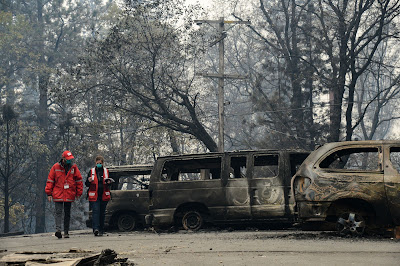by Michael de Vulpillieres, American Red Cross in Greater NY
Standing outside a shelter for wildfire evacuees on my first full day in Butte County, Calif., I met a couple from the town of Paradise who were forced to flee their home 36 hours earlier. Holding back tears, the husband detailed his traumatic escape while he showed me photos of the apocalyptic scenes he witnessed driving to safety. Despite losing his house and all his belongings, all that mattered to him was that his family was safe.
Throughout my deployment to Northern California I heard similarly harrowing stories every day. Maybe it was my Red Cross jacket but residents were very forthcoming about their ordeal. A man in line at Starbucks told me about his evacuation and how he knew to begin franticly loading up his car after hearing the fire which he said sounded like a freight train in the canyon just behind his house. A woman at a gas station, also left homeless by the fire, explained to me how her son ran nearly five miles to safety through thick black smoke after abandoning his car because traffic was at a standstill. An elderly woman I met at a shelter shared with me how she was forced to flee alone in her car, and how her terrifying drive to safety surrounded by flames took hours.
All the evacuees I met were still in shock and all but a few held out any hope that their houses were still standing. Many knew the fate of their homes because they were engulfed in flames by the time their cars reached the end of their driveways. That’s how quickly the fire moved.
A few days into my deployment, I saw firsthand the destruction that these families fled days earlier. Accompanied by officials from Cal Fire, my team visited the town of Paradise. What we witnessed was surreal and disorienting. Neighborhoods were barren, full of homes burned to their foundations, charred appliances and vehicles, melted metal and glass, pockets of smoldering ash. Occasionally we’d come across a sign of life and color, like a fully intact child’s toy.
None of the families I personally met lost loved ones to the fire, thankfully. But that is not to say that the anxiety and scope of loss was not palpable. In front of each shelter were bulletin boards containing lists, names and photos of missing individuals. There were also notes posted to these boards speaking directly to the missing: “I love you” “we miss you.” It was heartbreaking to see those boards fill up day after day.
But my time in California was also marked by moments of hope. Shining a light through the smoke and darkness was the generosity that poured in from near and far. I traveled from New York City to work with the Red Cross and met many fellow team members, mostly volunteers, from local communities, several who lost their homes, as well as from dozens of states across the country. Each day they worked tirelessly to help: providing shelter, meals, water, emotional support, health assistance, reunification and so much more.
And there were countless other individuals and organizations large and small providing just about anything you could imagine for the survivors: food, coffee, internet service, face masks, wifi, phones, clothes, music performances, services/supplies for pets, hay for rescued livestock, rides to the doctor, a room in their homes.
After I explained to an evacuee at a shelter where the meals were came from, the man looked at me, deeply humbled, and asked, “Why can’t we be this kind to each other every day?”


No comments:
Post a Comment
Note: Only a member of this blog may post a comment.